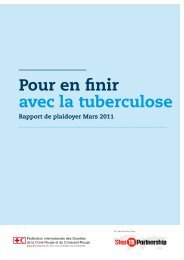Thailand - Stop TB Partnership
Thailand - Stop TB Partnership
Thailand - Stop TB Partnership
You also want an ePaper? Increase the reach of your titles
YUMPU automatically turns print PDFs into web optimized ePapers that Google loves.
Health reform<br />
There used to be a <strong>TB</strong> center here, and we could refer people there.<br />
Now we have to refer people to the hospital, using the 30 baht scheme.<br />
Some people living with HIV/AIDS are scared and reluctant to go to<br />
general hospitals. I try to talk to government officers about this problem.<br />
They say that <strong>TB</strong> work is [now] part of the municipality’s work, but it<br />
doesn’t work very well.<br />
—Samran Takan, director of New Life Friend Center 20<br />
In May 2000, the Office of Health System Reform initiated a consultative process for the<br />
development of a new national health bill to set the terms for a reform of the national health<br />
system. This process has resulted in a major effort to decentralize health programs and<br />
services. According to present plans, by 2010 the Ministry of Public Health (MoPH) will<br />
have shifted approximately 80 percent of its annual budget and 90 percent of its staff to the<br />
subdistrict and municipal levels. 21<br />
Decentralization has had a significant impact on the NTP, with a major reduction<br />
in dedicated funding and staff size. Thai <strong>TB</strong> experts give mixed reviews on the effects<br />
of decentralization so far, but agree that roles and responsibilities within the new system<br />
have not been communicated clearly, and that the emphasis on cost-cutting measures has<br />
compromised the effectiveness of the health system in general and <strong>TB</strong> control efforts in<br />
particular. As one regional director noted, “many directors of public hospitals are new [and]<br />
they don’t understand what is required—they only think about saving money.” 22<br />
Another outcome of the health reform was the introduction in 2003 of a countrywide<br />
health insurance system known as the universal coverage scheme or the 30 baht<br />
scheme (since patients pay only 30 baht or $0.79 for each hospital or clinic visit). The<br />
budget for universal coverage covers those drugs and other services identified as part of an<br />
“essential package of care,” which is delivered at MoPH and MoPH-affiliated facilities. <strong>TB</strong><br />
drugs (including the “second-line drugs” that are used to treat MDR-<strong>TB</strong>) are considered a<br />
component of “essential care,” and as such are financed through the universal coverage<br />
scheme. As of 2004, 75 percent of the population, or 47 million people, had their health<br />
insurance financed under the universal coverage scheme. Of the remaining 25 percent, or<br />
16 million people, 5 million civil servants receive health coverage through the Civil Servant<br />
Medical Benefit Scheme, 8 million receive coverage through the Social Security Scheme,<br />
and approximately 3 million are uninsured. 23<br />
However, there is no budget within the universal coverage system for training,<br />
supervision, and monitoring. The <strong>TB</strong> Cluster must negotiate with the Department of<br />
Disease Control (DDC) to receive nonuniversal coverage funding for these activities or rely<br />
40<br />
<strong>TB</strong> POLICY IN THAILAND



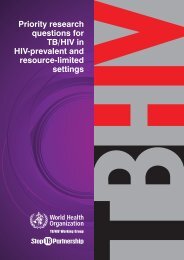
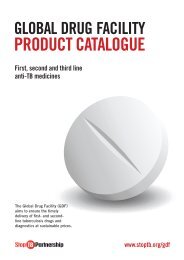
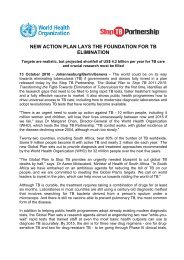
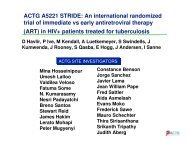
![Global Drug Facility Annual Report 2011 [.pdf] - Stop TB Partnership](https://img.yumpu.com/26788745/1/184x260/global-drug-facility-annual-report-2011-pdf-stop-tb-partnership.jpg?quality=85)

![Concept note on national stop TB partnership [.pdf]](https://img.yumpu.com/26788741/1/184x260/concept-note-on-national-stop-tb-partnership-pdf.jpg?quality=85)

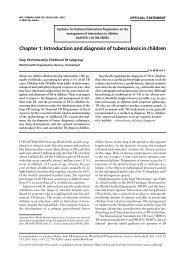
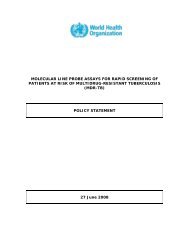
![2005 and Challenges for 2006 - 2015 [.pdf] - Stop TB Partnership](https://img.yumpu.com/26788674/1/190x245/2005-and-challenges-for-2006-2015-pdf-stop-tb-partnership.jpg?quality=85)
![Brochure (French) [.pdf] - Stop TB Partnership](https://img.yumpu.com/17234792/1/190x91/brochure-french-pdf-stop-tb-partnership.jpg?quality=85)

